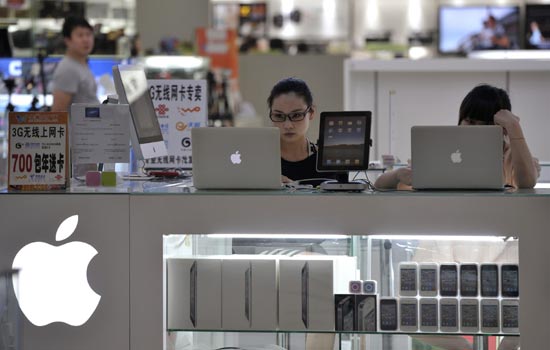
|
 |
|
Customers test Apple MacBooks on sale at an electronic products market in Nanjing, Jiangsu province. The authorities are urging Apple Inc to unify its global standards of intellectual property protection. [Photo/Agencies] |

The authorities are urging Apple Inc to unify its global intellectual property protection standards, in the wake of ongoing allegations that the US technology giant has infringed on the rights of some prominent Chinese writers.
Releasing details of its overall progress in cracking down on piracy and other intellectual property rights violations, the Ministry of Commerce said on Tuesday it now plans a wide-ranging consultation process among a cross-section of the Chinese literary community, including literary property owners and agents, and Apple itself, about the case.
The main aim will be to force the company to put systems in place to better-protect the lawful rights of intellectual property owners, under a common standard for IPR protection globally, they said.
During the briefing, officials also strongly disputed recent claims by the American Chamber of Commerce in China that IPR standards in the country have been dropping, damaging its business reputation abroad.
In late March, 22 leading Chinese writers sued Apple for pirating their works, claiming the US firm was infringing upon their copyrights by offering pirated e-book versions of their work on its App Store platform.
Some leading Chinese writers and literary figures are claiming that the affair could dampen writers' creativity and harm the healthy development of Chinese literature.
China Written Works Copyright Society, for instance, has already claimed compensation of more than 23 million yuan ($3.62 million) and announced that it "will do all it can" to support the 22 writers in their lawsuits.
China has been attaching huge importance to IPR protection, Chang Xiaocun, head of the ministry's market order department, told the briefing.
In accordance with the State Council's work outline on IPR protection released in May, the ministry is now planning to launch a nationwide campaign to stamp out IPR violations of trademarks, copyrights, patents and counterfeit products, particularly in the pharmaceuticals, cosmetics, agriculture materials, and automotive sectors, and of goods sold in rural areas.
According to the latest figures, national administrative law enforcement agencies investigated 78,773 cases of piracy and IPR infringement in the first four months of this year, estimated to be worth 1.81 billion yuan.
In a nine-month campaign last year, police closed 12,854 underground factories producing pirated and fake products, and broke up 4,904 gangs that had been selling them, according to the ministry.
"China's efforts at strengthening IPR protection and smashing piracy have made obvious progress," said Chang. He also challenged suggestions made in the report by the American Chamber of Commerce in China, which claimed China's intellectual property rights situation has actually deteriorated..
"Without objective investigation, the US business group's claims are biased, ignoring the progress and efforts that the Chinese government has made on improving IPR protection," he said.
He added that organizations and companies including the US International Trade Commission, and industry heavyweights Microsoft and Dupont have recently acknowledged China's progress on IPR protection.
According to other details released by the ministry, by the end of June, provincial and city governments across China have now installed sophisticated software systems aimed at helping detect IPR infringement.
To better promote its standards, there have also been strenuous efforts made at developing international cooperation on IPR protection, including the establishment of an IPR working group tasked with talking to and cooperating with counterpart authorities in the US, the European Union, Japan, Switzerland, Russia and Brazil, which will be sharing views and progress on the subject on a regular basis.
Chang added that China was also an active member of the discussions held to develop and negotiate IPR standards during the Doha Round of global trade negotiations.
baochang@chinadaily.com.cn